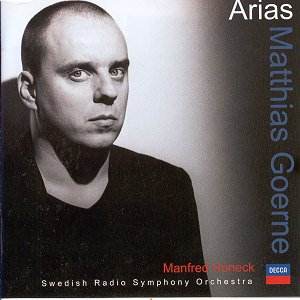ARIAS
Wolfgang Amadeus
MOZART
Die Zauberflöte: Der Vogelfänger bin ich ja; Bei
Männern, welche Liebe fühlen (1); Ein Mädchen oder
Weibchen
Le Nozze di Figaro: Hai già vinta la causa!; Crudel! Perché
finora (1)
Don Giovanni: Deh, vieni alla finestra
Richard WAGNER
Tannhäuser: Blick ich umher in diesen edlen Kreise; Wie Todesahnung
… O du mein holder Abendstern
Robert SCHUMANN
Szenen aus Goethes Faust: Ein Sumpf zieht am Gebirge
hin
Engelbert
HUMPERDINCK
Köningskinder: Verdorben! Gestorben! … Ihr Kindlein, sie sind
gefunden (2)
Richard STRAUSS
Ariadne auf Naxos: Harlekinlied (1)
Erich Wolfgang KORNGOLD
Die tote Stadt: Mein Sehnen, mein Wähnen (3)
Alban BERG: Wir arme Leut!; Dort links
geht's in die Stadt … Du sollst da bleiben,
arie (1)
 Matthias Goerne (baritone),
Dorothea Roschmann (1), Children's Choir from Adolf Fredriks Music School
(2), Ladies of the Swedish Radio Choir (3), Swedish Radio Symphony
Orchestra/Manfred Honeck
Matthias Goerne (baritone),
Dorothea Roschmann (1), Children's Choir from Adolf Fredriks Music School
(2), Ladies of the Swedish Radio Choir (3), Swedish Radio Symphony
Orchestra/Manfred Honeck
 Decca 467 263-2
[56.05]
Decca 467 263-2
[56.05]
Crotchet
AmazonUK
AmazonUS

This is a voice with a honeyed, mellow beauty right through its range, and
considerable power when needed. Goerne has made his reputation principally
as a lieder singer and I did wonder if his self-communing style in the Wagner
would carry across the footlights. Still, as a gramophone experience it is
totally satisfying, culminating in a Star of Eve as gently caressed
as it is possible to imagine. He is also to be commended for the inclusion
of some lesser-known items, which all benefit from his detailed attention
to words without ever compromising the musical line. He is such a musical
singer. Although I had quite a pile of discs awaiting review my reaction
to the Korngold was to play it again!
Any doubts centre upon the Mozart. He is a graver Papageno than we usually
hear, rather lacking a smile in his voice. A comparison of the Count's aria
with Alfred Poell's account in the classic Erich Kleiber set reveals that
a certain ping is needed for this repertoire which Goerne doesn't have. You
would expect a comparison with Cesare Siepi's classic Don (under Krips) to
lead the same way, but here the manner is entirely credible. This silky,
mellifluous charmer could be a very dangerous heartbreaker indeed.
Still, it is for the romantic/modern pieces that this recital is most likely
to be bought, and I hope it will be bought very widely indeed. Honeck is
an extremely positive partner and Dorothea Roschmann contributes pleasingly
without ever attracting undue attention to herself. The recording is excellent
and we get a typically well-informed essay from John Steane plus full texts
and translations in English, French and German.
Even the best-laid plans of mice and men are liable to have oddities here
and there. This disc's minor eccentricity is to place the Figaro scene with
Susanna after the aria which it shortly precedes in the opera.
Christopher Howell

